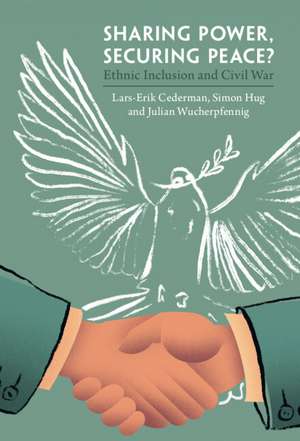Sharing Power, Securing Peace?: Ethnic Inclusion and Civil War
Autor Lars-Erik Cederman, Simon Hug, Julian Wucherpfennigen Limba Engleză Paperback – 6 iul 2022
| Toate formatele și edițiile | Preț | Express |
|---|---|---|
| Paperback (1) | 238.34 lei 6-8 săpt. | |
| Cambridge University Press – 6 iul 2022 | 238.34 lei 6-8 săpt. | |
| Hardback (1) | 585.93 lei 6-8 săpt. | |
| Cambridge University Press – 6 iul 2022 | 585.93 lei 6-8 săpt. |
Preț: 238.34 lei
Nou
Puncte Express: 358
Preț estimativ în valută:
45.61€ • 47.62$ • 37.74£
45.61€ • 47.62$ • 37.74£
Carte tipărită la comandă
Livrare economică 04-18 aprilie
Preluare comenzi: 021 569.72.76
Specificații
ISBN-13: 9781108406550
ISBN-10: 1108406556
Pagini: 300
Dimensiuni: 151 x 228 x 18 mm
Greutate: 0.45 kg
Ediția:Nouă
Editura: Cambridge University Press
Colecția Cambridge University Press
Locul publicării:New York, United States
ISBN-10: 1108406556
Pagini: 300
Dimensiuni: 151 x 228 x 18 mm
Greutate: 0.45 kg
Ediția:Nouă
Editura: Cambridge University Press
Colecția Cambridge University Press
Locul publicării:New York, United States
Cuprins
1. Introduction; Part I. Theories and concepts; 2. Power sharing and conflict in the literature; 3. Key concepts and arguments of our approach; Part II. Analyzing the effect of power sharing on civil war; 4. Power sharing and civil war: Data and baseline models; 5. Contrasting formal power-sharing institutions and practices; 6. Endogenizing governmental power sharing and its effect on civil war; 7. The strategic logic of governmental power sharing and civil war; 8. The effect of territorial and governmental power sharing on civil war; 9. The strategic logic of territorial power sharing, secession and civil war; Part III. Power sharing and civil war in time and space; 10. The diffusion of power sharing; 11. Trends in power sharing and conflict; 12. Conclusions for theory and policy.
Recenzii
'This masterful analysis shows conclusively that much of the skepticism regarding power-sharing is misguided. While power-sharing does not offer any firm guarantees for peace and stability, inclusive practices at the center and territorially shared power clearly remain the most promising tools for solving and preventing serious ethnic and other conflicts. The book's conclusions are highly valuable for scholars and even more so for practical policy-makers.' Arend Lijphart, Research Professor Emeritus of Political Science, University of California, San Diego
'Theoretically and methodologically ambitious, impressively global in scope, and covering both conflict and non-conflict contexts, Cederman, Hug and Wucherpfennig convincingly argue that power-sharing builds peace in multi-ethnic states. These findings should guide scholars and practitioners in how to promote inclusive governance.' Elisabeth King, co-author of Diversity, Violence, and Recognition: How Recognizing Ethnic Identity Promotes Peace
'As Fred Iklé's classic book states in its title, 'Every War Must End,' and most civil wars end with some form of power-sharing, formal or informal, between the state and its challengers. This landmark book by Cederman, Hug, and Wucherpfennig offers valuable new insights and a wealth of new empirical results on whether sharing power helps secure the peace in the aftermath of ethnic war. With attention to the usual methodological pitfalls in the analysis of observational data and conceptual innovations throughout their book, Cederman, Hug, and Wucherpfennig provide a strong argument for the peace-inducing effects of the practice - rather than merely the promise - of sharing political power, while also noting that power-sharing institutions are no panacea. This extraordinary book charts the way forward in the quantitative study of civil war.' Nicholas Sambanis, Professor of Political Science, The University of Pennsylvania
'Theoretically and methodologically ambitious, impressively global in scope, and covering both conflict and non-conflict contexts, Cederman, Hug and Wucherpfennig convincingly argue that power-sharing builds peace in multi-ethnic states. These findings should guide scholars and practitioners in how to promote inclusive governance.' Elisabeth King, co-author of Diversity, Violence, and Recognition: How Recognizing Ethnic Identity Promotes Peace
'As Fred Iklé's classic book states in its title, 'Every War Must End,' and most civil wars end with some form of power-sharing, formal or informal, between the state and its challengers. This landmark book by Cederman, Hug, and Wucherpfennig offers valuable new insights and a wealth of new empirical results on whether sharing power helps secure the peace in the aftermath of ethnic war. With attention to the usual methodological pitfalls in the analysis of observational data and conceptual innovations throughout their book, Cederman, Hug, and Wucherpfennig provide a strong argument for the peace-inducing effects of the practice - rather than merely the promise - of sharing political power, while also noting that power-sharing institutions are no panacea. This extraordinary book charts the way forward in the quantitative study of civil war.' Nicholas Sambanis, Professor of Political Science, The University of Pennsylvania
Notă biografică
Descriere
Shows how power-sharing practices reduce violence both preventively and after conflicts by giving potential violent challengers access to central and/or regional power.
